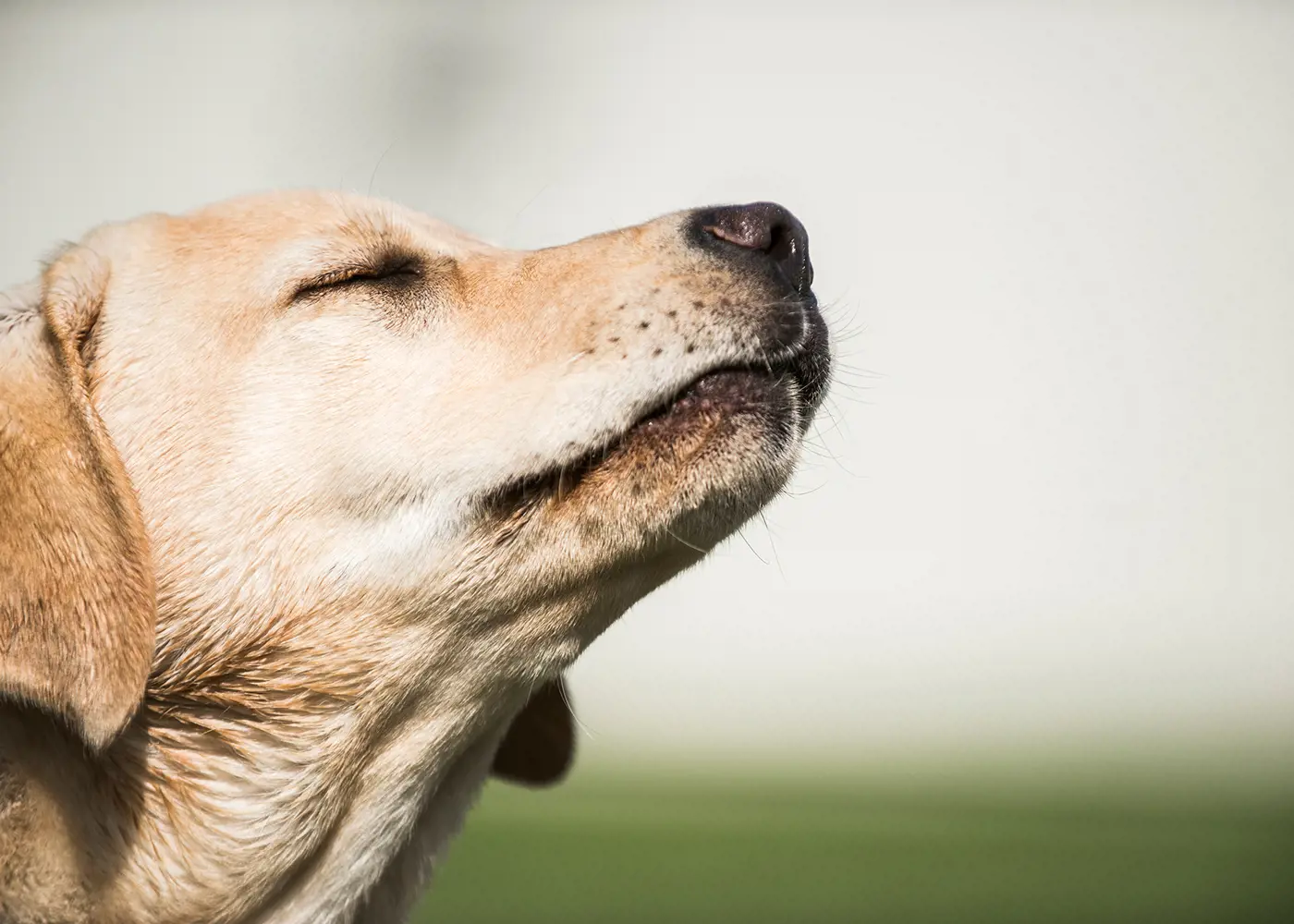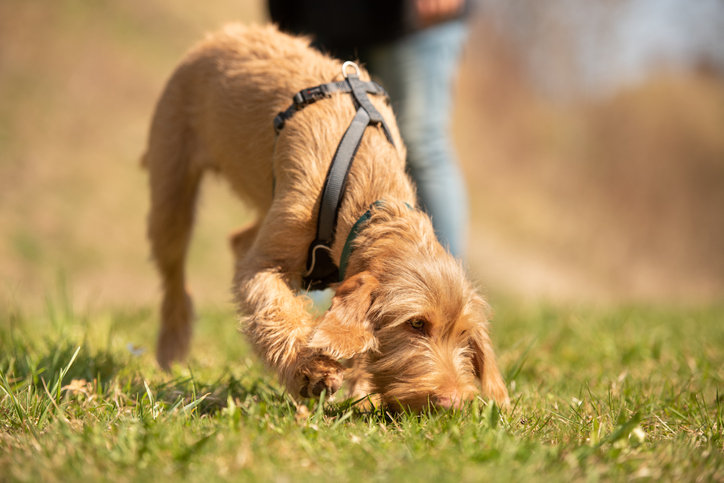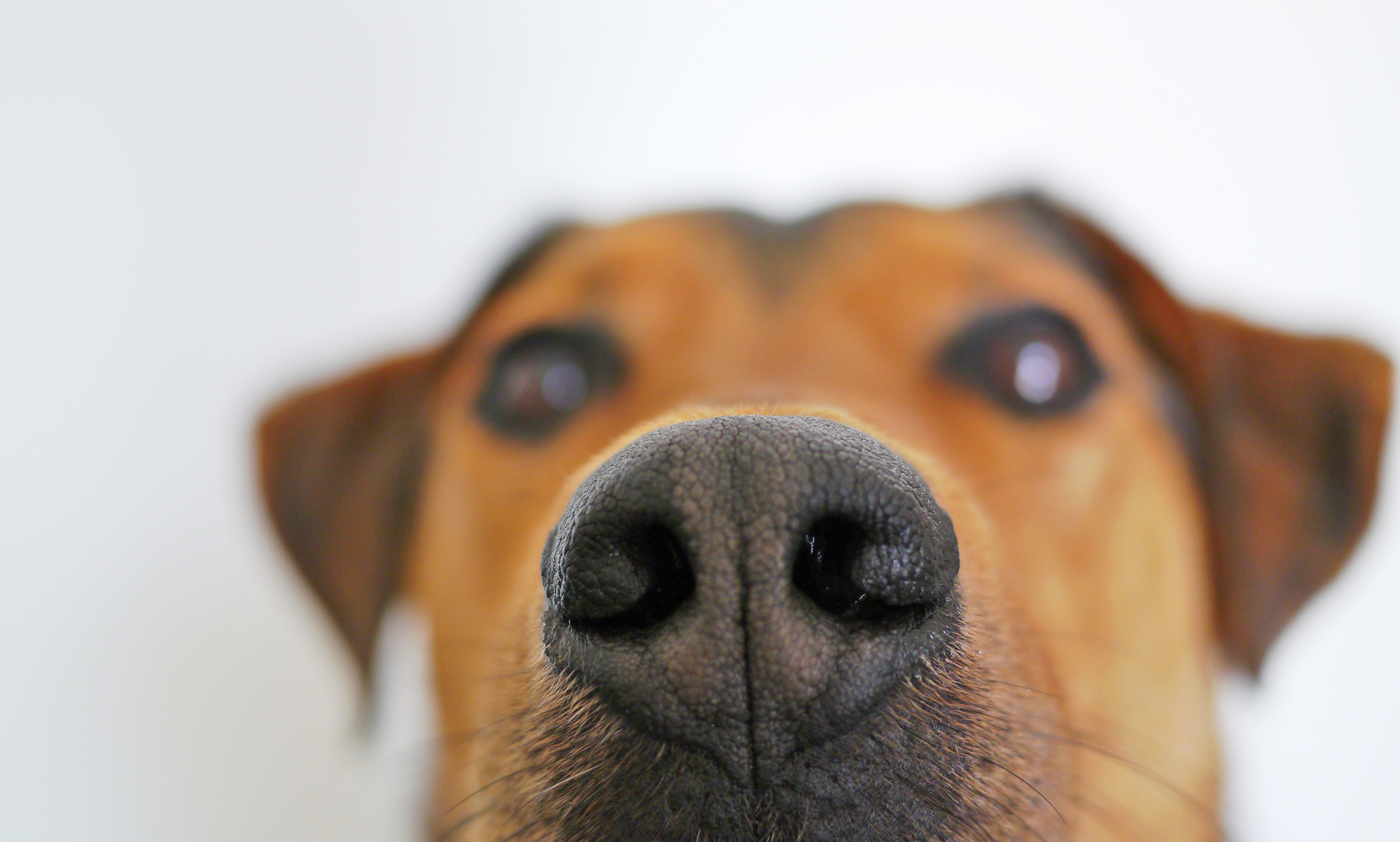Why do dogs sniff?
21st October, 2019

Admit it: this question must have crossed your mind at some point during your doggy ownership lifetime! Just why do dogs love a good sniff?
Pooches seem intent on incessantly sniffing everything in sight. Take them on a walk and you’ll notice how their wet noses wiggle back and forth almost non-stop.
They’ll sniff around lamp posts, beneath bushes and on seemingly-random patches of grass. And, of course, they’ll try to greet every fellow dog they see by sniffing their rear ends, before having a good sniff of the area they’re about to do their business on.
This type of behaviour is perfectly normal for a pooch – it’s a natural instinct! If you’re the proud owner of a canine, you need to make sure they’re covered just in case their noses get them into a ‘whiff’ of trouble!
Dog insurance from Purely Pets is designed to bring owners peace of mind that their pooches will receive the care they need to recover from an illness or injury. We’ve specially designed 15 levels of dog insurance so that you can choose the cover that’s right for you and your canine. Insure your pet with Purely Pets and you’ll get 24-hour access to a Vet Helpline and ‘Manage My Policy’ portal, too.
So, why do dogs sniff?
Dogs are born to sniff, writes Purina. Not only are mutts at least 1,000 times better than humans at identifying smells, but the part of their brain dedicated to analysing smells is 40 times greater than ours. A dog’s sniffer contains around 220 million so-called ‘olfactory receptors,’ while humans have a measly five million.
When a canine has a sniff, the air that’s breathed in passes through nasal skin cells – the same cells that are found in a special organ dogs have called the Jacobsen’s organ.
This organ is considered to be key in the detection of body-related scents, and could very well be the reason why dogs are so skilled at identifying and recognising different animals and humans. Astonishingly, dogs can even distinguish between identical twins thanks to their super smart snouts.
While every single dog nose is unique, there are certain breeds known to have an especially acute sense of smell. The bloodhound tops the list for its scent-detection abilities, while gundog breeds like spaniels and retrievers spend the most time sniffing on walks.

Humans are visual creatures, whereas dogs are led by their noses. Speaking to The Dog People, dog psychology expert Dr. Stanley Coren explains how dogs “are living in a totally different world than we are, filled with much, much more information than we can possibly process about smell.”
He uses an example of smelling a chilli being cooked. Humans and their less-superior sense of smell will smell a “mishmash smell of everything altogether.” However, he explains: “A dog’s brain breaks it up; they smell the meat, tomatoes, the spices, the peppers – each being separated.
“There is much more for them to process, so they spend more time sniffing things because they are trying to distinguish the components.”
So, there we have it. Dogs sniff because scent is their primary sense. Much like we would look all around us on a walk, dogs sniff all around them!
Why dogs sniff other dogs
Dogs sniff other dogs because a lot of information can be gained about them this way. They’ll usually sniff where smells congregate and are dispersed, which is typically around the ano-genital region. Hence why dogs like sniffing other dogs’ bottoms!
A Mental Floss article sums up this greeting perfectly: ‘A butt sniff for dogs is like a handshake for humans’! But more than a handshake, when a dog sniffs another dog, it can help them to determine things like whether the dog is a boy or girl, how old it is, what it eats and even what kind of mood they’re in. They can also determine whether the dogs have met before or this is their first greeting. Clever, huh?
If your mutt loves a good butt sniff, it’s really nothing to be embarrassed about! It’s simply their way of saying ‘hello’ to another pooch. If it starts to annoy another canine, though, then you’ll want to encourage them to do something else.

Why dogs sniff on a walk
If your walks consist primarily of starting and stopping while your pooch has a good sniff, you’re not alone! The great outdoors is a total ‘scent sensation’ and your dog will be eager to gain as much information through his or her sniffer as possible.
When your dog strolls up to a lamp post, gives it a sniff then goes to the toilet, it’s able to gain information on fellow pooches in their neighbourhood – their sex, reproductive status and when they passed by.
The same type of information can be gained by sniffing another animal’s poop, or – much to the dismay of owners – by rolling in it. ‘For a dog, this is like wearing perfume!’ explains Purina.
You should let your dog have a good sniff, but if it’s time to move on then use a command like ‘walk on’ and give them a treat to reward them. This will help to reinforce this good behaviour and will hopefully mean that future walks aren’t interrupted every few seconds!
When sniffing becomes too much
While it’s natural for your pooch to sniff other animals, it can be embarrassing if they were to sniff humans in the same body regions.
If this is a common occurrence, then you should use a lead to control their movements, while teaching them to greet people by calmly sniffing their hand. Again, reward them when they’re well-behaved so that they’re incentivised to repeat the behaviour the next time they meet a human.
Dog insurance from Purely Pets
Dog insurance is not to be ‘sniffed at’! Protect your pooch against unexpected mishaps with Purely Pets dog insurance. We can find you the right level of cover for you and your dog, for a price that’s right.
Helpful Pages
Recent Posts
Pet Insurance Quote
- 98% claims paid *
- Claims paid directly to vets
- 24/7 vet video consultations
- Interest free monthly payments




